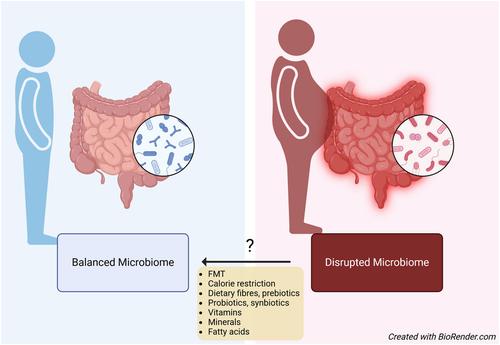当前位置:
X-MOL 学术
›
Ann. N. Y. Acad. Sci.
›
论文详情
Our official English website, www.x-mol.net, welcomes your
feedback! (Note: you will need to create a separate account there.)
Understanding the role of the human gut microbiome in overweight and obesity
Annals of the New York Academy of Sciences ( IF 4.1 ) Pub Date : 2024-09-16 , DOI: 10.1111/nyas.15215 Michael I. McBurney, Clara E. Cho
Annals of the New York Academy of Sciences ( IF 4.1 ) Pub Date : 2024-09-16 , DOI: 10.1111/nyas.15215 Michael I. McBurney, Clara E. Cho

|
The gut microbiome may be related to the prevalence of overweight and obesity, but high interindividual variability of the human microbiome complicates our understanding. Obesity often occurs concomitantly with micronutrient deficiencies that impair energy metabolism. Microbiota composition is affected by diet. Host–microbiota interactions are bidirectional. We propose three pathways whereby these interactions may modulate the gut microbiome and obesity: (1) ingested compounds or derivatives affecting small intestinal transit, endogenous secretions, digestion, absorption, microbiome balance, and gut barrier function directly affect host metabolism; (2) substrate availability affecting colonic microbial composition and contact with the gut barrier; and (3) microbial end products affecting host metabolism. The quantity/concentration, duration, and/or frequency (circadian rhythm) of changes in these pathways can alter the gut microbiome, disrupt the gut barrier, alter host immunity, and increase the risk of and progression to overweight and obesity. Host-specific characteristics (e.g., genetic variations) may further affect individual sensitivity and/or resilience to diet- and microbiome-associated perturbations in the colonic environment. In this narrative review, the effects of selected interventions, including fecal microbiota transplantation, dietary calorie restriction, dietary fibers and prebiotics, probiotics and synbiotics, vitamins, minerals, and fatty acids, on the gut microbiome, body weight, and/or adiposity are summarized to help identify mechanisms of action and research opportunities.
中文翻译:

了解人体肠道微生物组在超重和肥胖中的作用
肠道微生物组可能与超重和肥胖的患病率有关,但人类微生物组的高度个体间变异性使我们的理解复杂化。肥胖通常与损害能量代谢的微量营养素缺乏同时发生。微生物群组成受饮食影响。宿主-微生物群相互作用是双向的。我们提出了三种途径,这些相互作用可能调节肠道微生物组和肥胖:(1) 摄入的化合物或衍生物影响小肠转运、内源性分泌物、消化、吸收、微生物组平衡和肠道屏障功能直接影响宿主代谢;(2) 影响结肠微生物组成和与肠道屏障接触的底物可用性;(3) 影响宿主代谢的微生物终产物。这些途径变化的数量/浓度、持续时间和/或频率(昼夜节律)可以改变肠道微生物组,破坏肠道屏障,改变宿主免疫力,并增加超重和肥胖的风险和进展。宿主特异性特征(例如,遗传变异)可能会进一步影响个体对结肠环境中饮食和微生物组相关扰动的敏感性和/或恢复力。在本叙述性综述中,总结了选定的干预措施,包括粪便微生物群移植、膳食卡路里限制、膳食纤维和益生元、益生菌和合生元、维生素、矿物质和脂肪酸,对肠道微生物组、体重和/或肥胖的影响,以帮助确定作用机制和研究机会。
更新日期:2024-09-16
中文翻译:

了解人体肠道微生物组在超重和肥胖中的作用
肠道微生物组可能与超重和肥胖的患病率有关,但人类微生物组的高度个体间变异性使我们的理解复杂化。肥胖通常与损害能量代谢的微量营养素缺乏同时发生。微生物群组成受饮食影响。宿主-微生物群相互作用是双向的。我们提出了三种途径,这些相互作用可能调节肠道微生物组和肥胖:(1) 摄入的化合物或衍生物影响小肠转运、内源性分泌物、消化、吸收、微生物组平衡和肠道屏障功能直接影响宿主代谢;(2) 影响结肠微生物组成和与肠道屏障接触的底物可用性;(3) 影响宿主代谢的微生物终产物。这些途径变化的数量/浓度、持续时间和/或频率(昼夜节律)可以改变肠道微生物组,破坏肠道屏障,改变宿主免疫力,并增加超重和肥胖的风险和进展。宿主特异性特征(例如,遗传变异)可能会进一步影响个体对结肠环境中饮食和微生物组相关扰动的敏感性和/或恢复力。在本叙述性综述中,总结了选定的干预措施,包括粪便微生物群移植、膳食卡路里限制、膳食纤维和益生元、益生菌和合生元、维生素、矿物质和脂肪酸,对肠道微生物组、体重和/或肥胖的影响,以帮助确定作用机制和研究机会。


















































 京公网安备 11010802027423号
京公网安备 11010802027423号